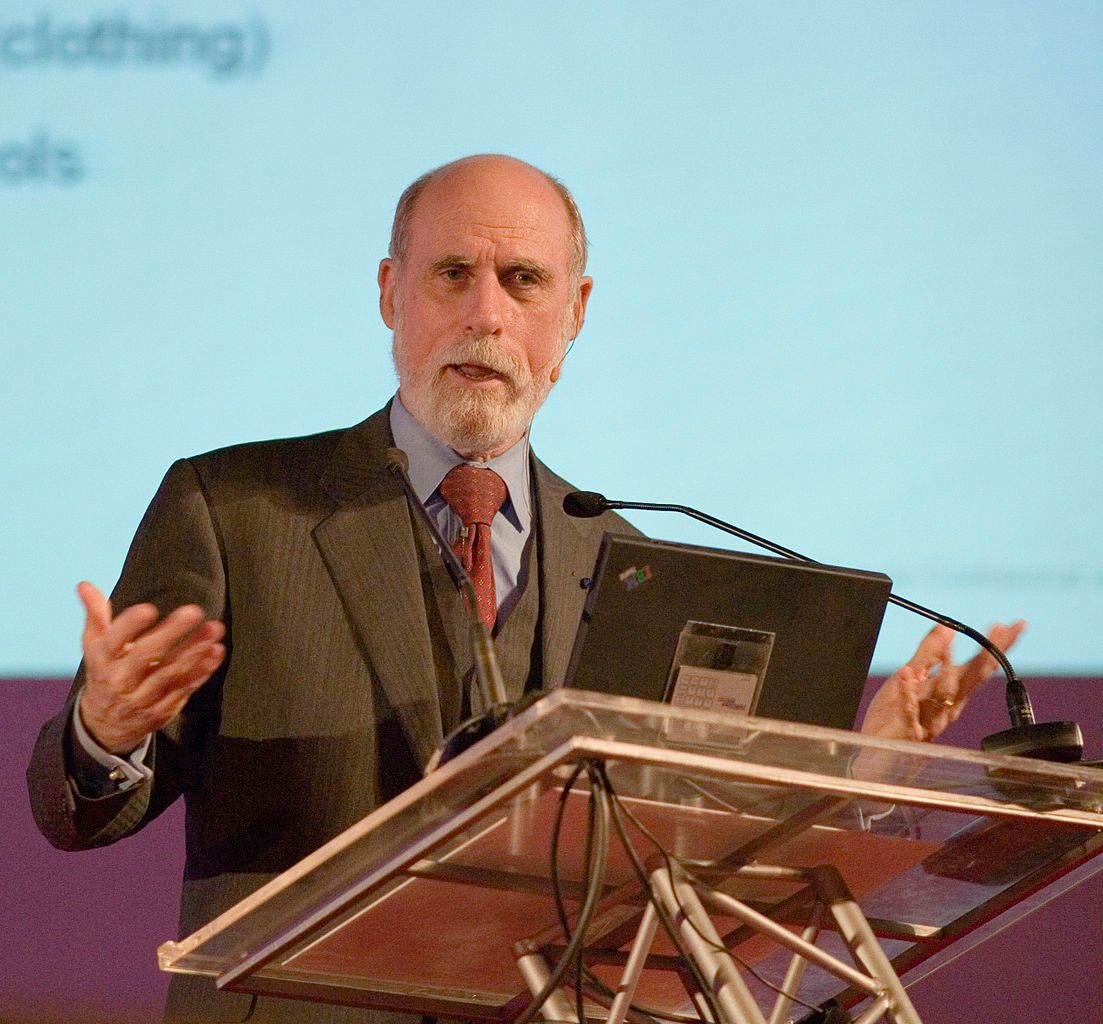Vint Cerf Lecture at UGent

I've had the pleasure of attending a talk with Vint Cerf, an American Computer Scientist recognized as one of the fathers of the Internet.
My understanding is that he had been invited by UGent mainly to talk about Google's contribution to the literary world with its huge project to help digitize all literary works, specially those of the past to safeguard our cultural heritage. But that was but a small part of the event.
Google Glass
The talk started with a promo video for Google Glass, the latest gadget from Google which Vint was wearing during the whole session.
After a little demo of Google Glass, Vint went on to describe it as:
"Strapping a mobile phone to your forehead."
An interesting thing he brought up was the way the device brought sound to the ears. It doesn't need ear-buds, but rather, uses bone conduction, transmitting vibrations to the inner ear through the skull.
The goal of this project, is to let people explore what they can do with computing. In a way, breaking the barriers that we have now, and improving it along the way based on feedback from society (privacy concerns etc...)
He brought up an accessibility example of how Google Glass could impact the life of people with disabilities such as the hearing and visually impaired. The device could convert speech to text, and interpret sign-language into audio. The latter however still needs further development.
The usual concerns were brought up, what about privacy?
He made a valid point by comparing the device with the introduction of the first camera's which also had to endure mixed public reception until society came up with an appropriate usage ( ask politely before snapping pictures of people, etc ).
Likewise it will also need to be approved by the general public (red light to indicate filming is in progress, ...)
Vint gave two examples of how Google has reacted to criticism:
- Videos are 10 seconds in length (unless extended)
- The device only does that when explicitly asked to
Who is Vint ?
A general introduction and background story was given.
His role with developing what would become the IP Layer and TCP protocol.
You can consult Wikipedia and... Google! to find out more.
The rest is history.
On the question about Snowden's revelations and concerns about political barriers impeding the Internet, Vint had the following to say:
- He insisted that Google does not share private data of users with governments, unless through court order, and even then in some cases go to the extent to fight it off in court when the demands are too high.
- They are doing everything they can to secure connections between users and their servers, the connections between the Datacenters. However he notes, once the connections leave the premises of Google's controlled perimeter, no guarantees can be made of what happens to that traffic in transit on the Wild Wild Web.
- He used the term 'Balkanization' to describe how governments are trying to seize more control over the Internet as an instrument of power and mass control ( although he did admit that his Balkan friends don't really like that word ). People need to recognize it's not Google the source of the issue, just government agencies. He hopes that we collectively can solve that and keep the Internet open.
One memorable thing that came up during the Q&A session that stuck was how IP and TCP came to be:
"In the past we sought to interconnect multiple machines that were not talking to each other,
and so we created IP and TCP.
Fast Forward.
Now we have Clouds not talking to each other, the next step is linking them together."
I truly believe this will be the next best thing that needs to be achieved.
Google Digitization Project
The person in-charge at the Boekentoren in Gent came on stage to talk about the collaboration with Google to digitize their wealth in books, to make them accessible for anyone and talk about some of the challenges, interestingly mostly copyright related.
Google apparently has a far more stricter policy regarding that, and only complies the digitization of books before 1873 to avoid copyright issues entirely.
The most memorable thing to me from this part of the talk was a quote and reply from the head of the Boekentoren to break down the old way of thinking:
"What's the use of collecting if nobody knows?"
to which her answer is:
"What's the use when nobody shares?"
There is a lot of copyrighted literature out there, but no longer in print, and people can't discover them.
Old physical books are not very accessible, specially when the distance to that specific library is so great. But when it's digitized, its content is available to anyone.
Another mayor benefit of this project: it brings search to our ancient knowledge.
Catalogs only provide the ability to search by author, name or date. With extensive search, a whole new window to our past opens up...
Google's Datacenter in Mons
In the next session of the talk, the Datacenter of Google in Mons was highlighted.
"They are not only Datacenters, they are also Data Processing Centers"
With Data Processing Centers, they were referring to the processing of email, analytics and constant transfers between other datacenters over fiber.
It was said that the servers running there, are operating at ambient temperatures between 28 and 30 degrees, and how that is cost effective seeing as a lower amount of energy is required for cooling. Something that apparently not many have been successfully able to achieve.
Visions of the future
When asked how things would look like in 2050, Vint listed a number of things:
Much more mobile radio, "the Internet of things", billions of devices interconnected, sharing data, instrumentation of the human body and environmental control.
In theory, technology supporting and helping us, like in Star Trek, controlling home automation by way of speech.
He also expressed his opinion that in the future we would most likely face the same problems as the past, possibly also more ( environmental issues ).
Conclusions
It's always special when you get to see someone who's work has deeply affected the world you live in (and getting to see them alive and not in some history book).
I was expecting a more in-depth, personal talk on how the Internet came to be. The title of the event was in fact: "History of the Internet by Google - A unique meeting with Vint Cerf, the father of the Internet."
I'm not sure if I was perhaps expecting too much, but still, it was quite an experience none the less.
